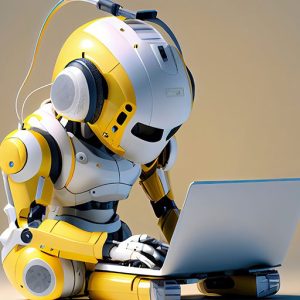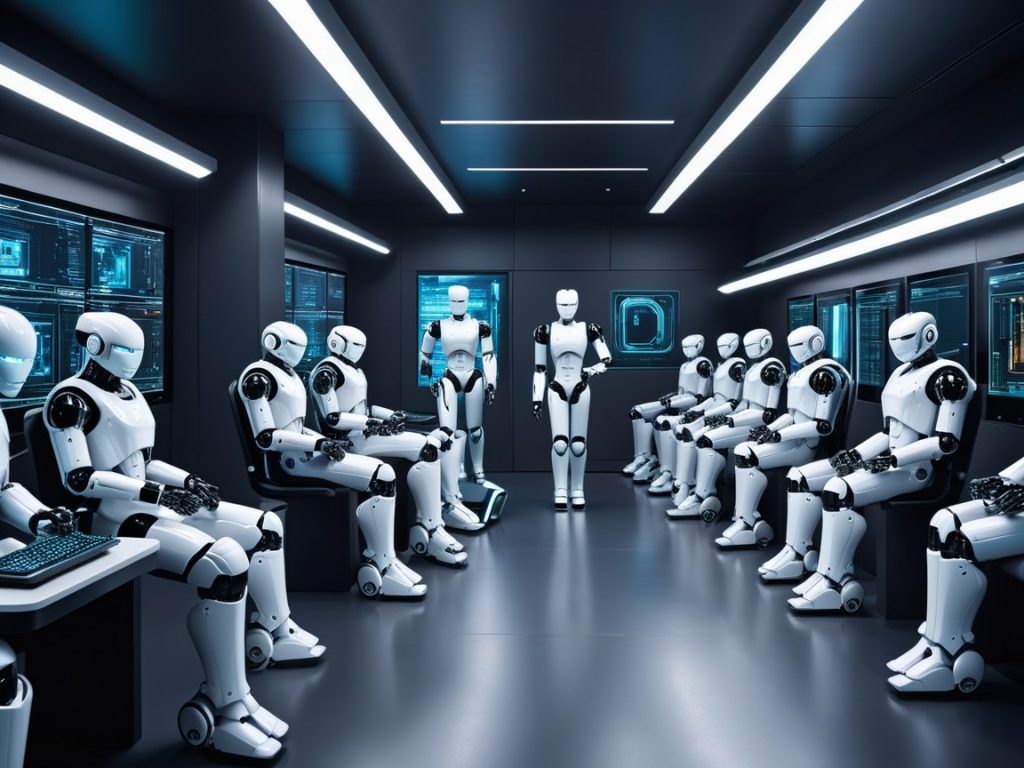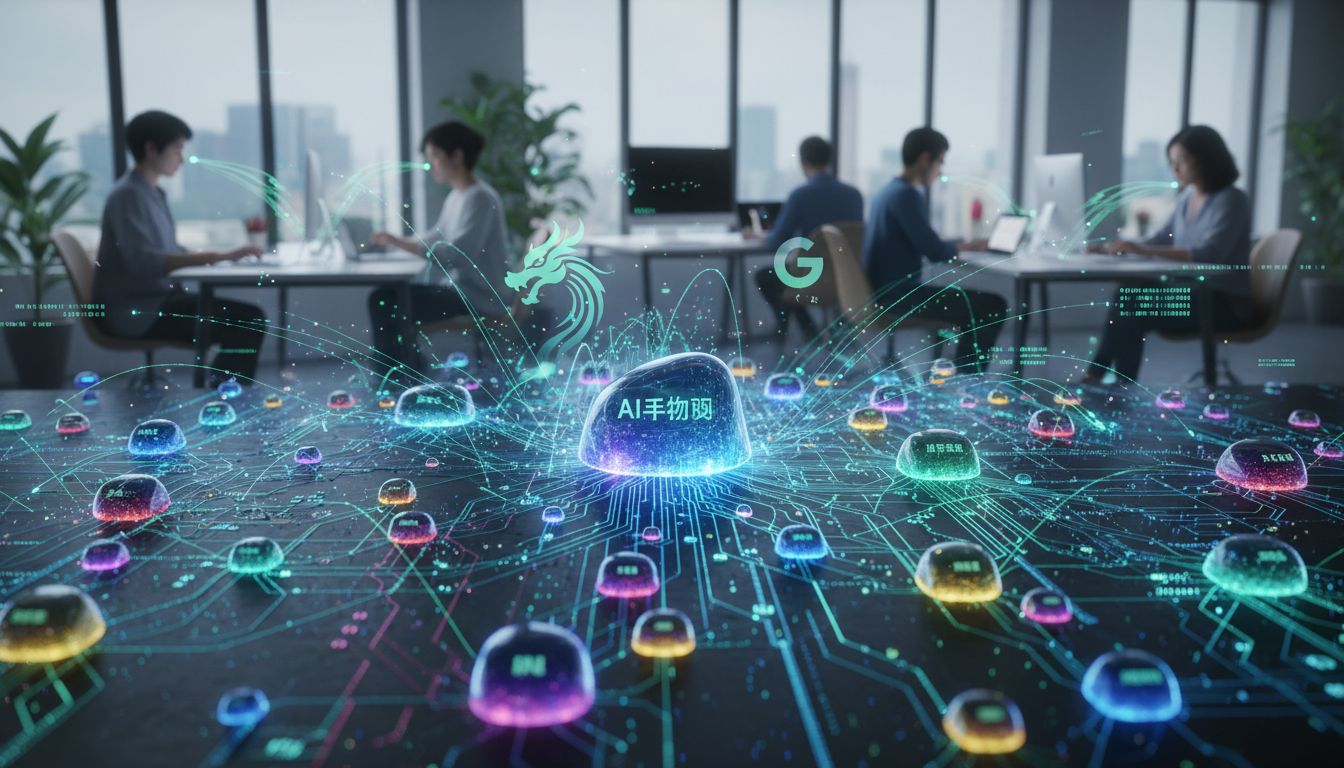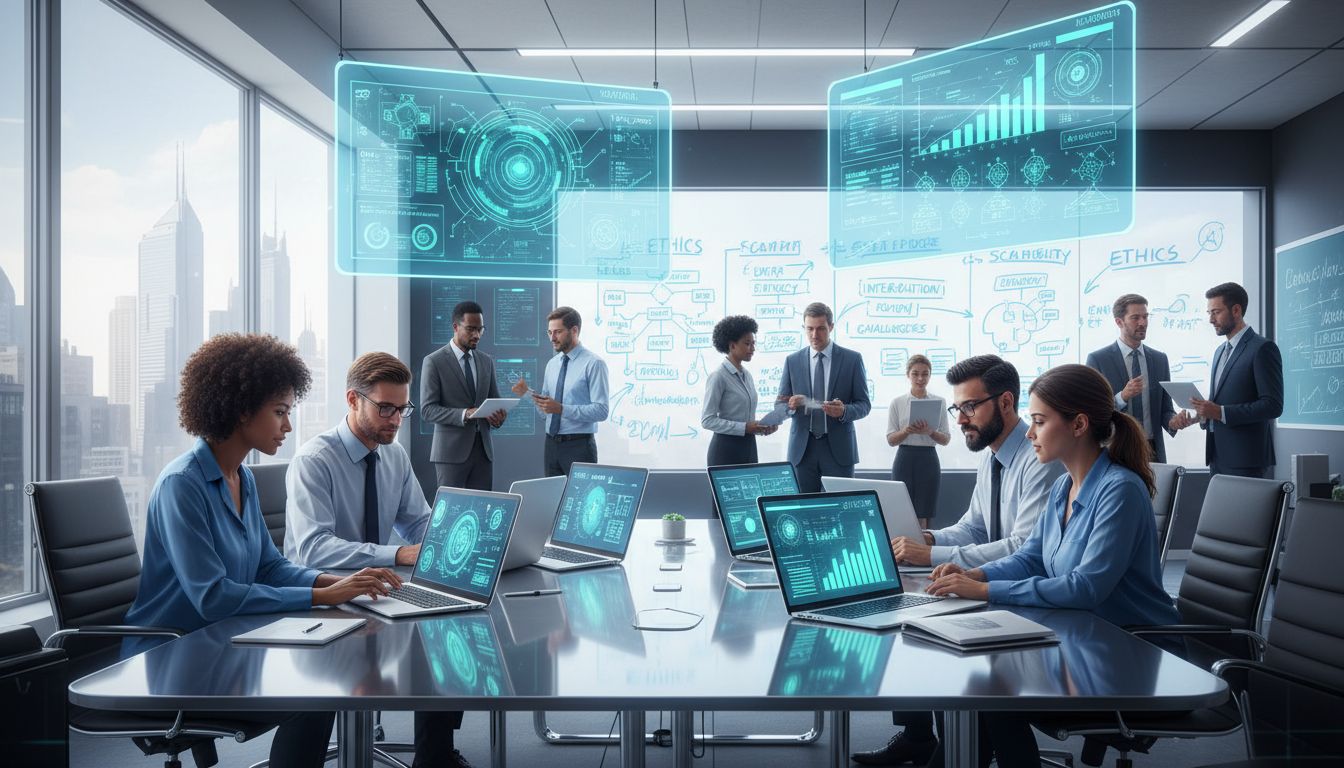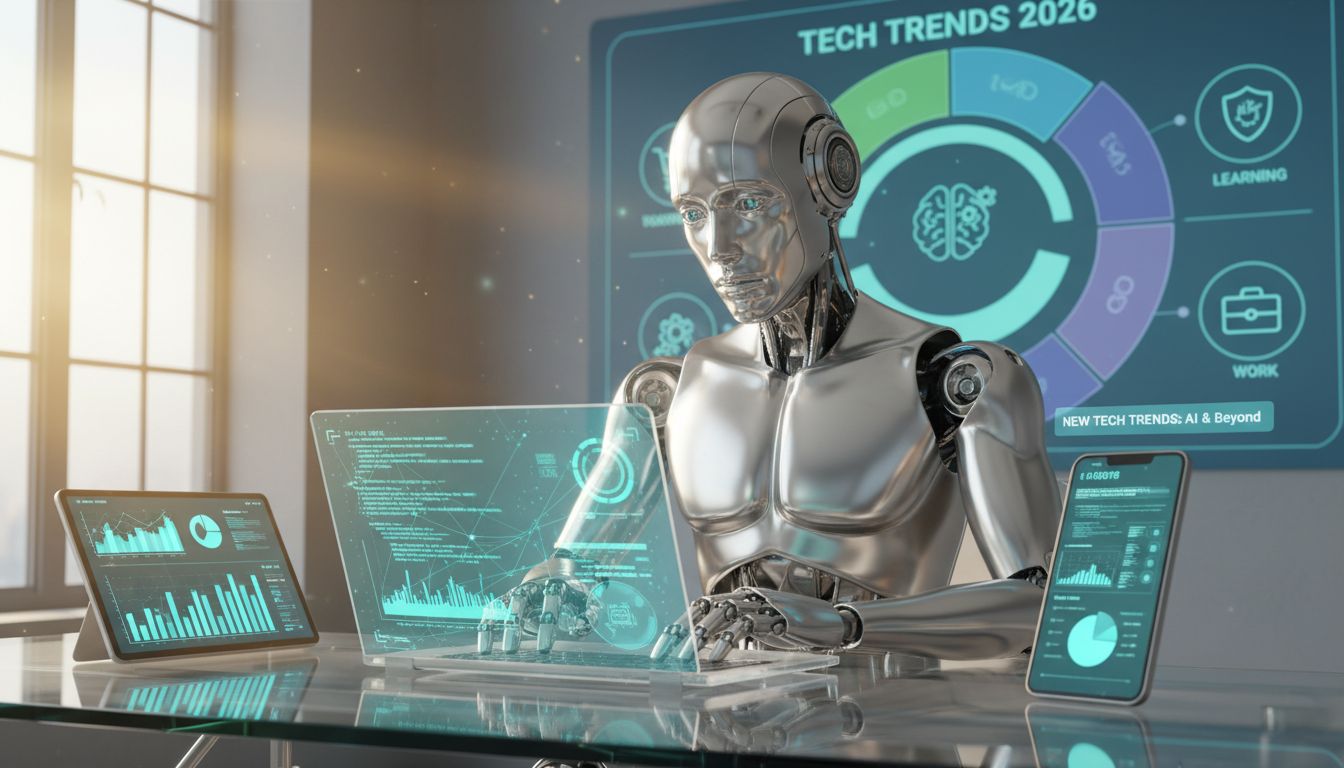For years, artificial intelligence has held a mythical place in our collective imagination. Often portrayed as either a benevolent helper or a sinister threat, AI’s true nature in 2025 is far more nuanced. This isn’t about robots taking over; it’s about quiet transformation. AI trends in 2025 are subtly reshaping how we live and work, creating opportunities we can’t afford to ignore. This is especially true if you write blogs, use the web, invest in the stock market, or plan for your children’s college and career choices. These changes are significant. If you think AI trends in 2025 are a side issue, prepare yourself.
Table of Contents:
- AI Trends Shaping 2025
- Generative AI and Responsible AI in AI Trends 2025
- AI-Powered Automation and Conversational AI
- Edge AI and Human-AI Collaboration in AI Trends 2025
- Impacts of AI Trends 2025 on Economy, Society, and Politics
- FAQs about AI trends 2025
- Conclusion
AI Trends Shaping 2025
These pivotal AI trends are transforming every facet of multiple industries at a breakneck pace.
The Rise of Generative AI
Generative AI is exploding, changing how we create. By 2025, expect AI-generated content everywhere, from personalized marketing materials to custom visuals.
Generative AI models like GPT-3 and DALL-E are streamlining creativity and boosting innovation. This is just the beginning. Imagine generating computer code, creating images, optimizing drug therapies, or making videos from your phone with zero technical or video-editing experience. OpenAI’s GPT-4 is now enabling more real-time creativity through integrating applications with its sophisticated engine.
Emphasizing Responsible AI
With great power comes great responsibility. This has never been truer than with AI.
The growing influence of AI means ethical AI deployment is imperative. Transparency and accountability in AI systems are paramount.
As AI integrates further into our world, incorporating fairness checks, explainable AI, and robust AI governance frameworks will build public trust. Developers strive to stay ahead of the curve as AI models become increasingly important.
AI-Powered Automation Expansion: New AI in 2025
AI is transforming industries by fundamentally changing processes, not just automating individual tasks. Many people wonder about the future trends of AI and how automation is transforming businesses and sectors.
Expect smarter AI systems that process information rapidly, improving accuracy, and enabling real-time decisions. AI integration reduces human error and fuels economic growth by replacing traditional workflows with more efficient AI solutions. This increased operational efficiency impacts multiple business functions.
Advancements in Conversational AI
Chatbots are improving significantly. Expect more seamless, human-like interactions with your virtual assistants.
As conversational AI evolves, improved natural language processing will enable AI to handle complex dialogues. Contextual understanding, not just keyword recognition, drives progress.
The Shift Toward Edge AI
Processing data at the edge, on devices like smartphones, reduces delays and enhances privacy.
Edge AI offers faster processing and better privacy because less data is uploaded to central servers. This localized, rapid processing combined with improved data security has a greater impact than most people realize.
AI trends in 2025 and payment security are increasingly influenced by Edge AI, as seen in the evolution of payment options. Edge AI becomes increasingly important for secure transactions on the go.
Hybrid Human-AI Collaboration
AI trends 2025 highlight the shift from replacement narratives to augmentation and hybrid systems.
AI is not about replacing humans; it’s about enhancing human work. AI systems are becoming partners, improving decision quality and data safety.
Generative AI and Responsible AI in AI Trends 2025
Generative AI models will become more prevalent by 2025. However, ethical considerations are paramount. With great power comes great responsibility. This concept is especially crucial as generative models evolve beyond text production to fully autonomous digital systems.
We must consider the moral and social ethics of these advanced AI tools.
Specific Uses and Future Prospects of Generative AI
Generative AI’s impact extends beyond content creation. It will shape product design, personalize education, and accelerate scientific discovery. Its influence will reach many unforeseen fields.
The fusion of human creativity with AI’s speed offers tremendous potential if safeguards are in place. Responsible use and public understanding are crucial for the future of this field, especially considering the potential for misuse by malicious actors.
Implementing Responsible AI Practices
Practical steps are crucial. Ethical frameworks must include implementing guidelines to ensure fairness, transparency, and accountability in AI systems. This will build public trust and confidence.
Implementing responsible AI involves bias detection, clear documentation, and continuous monitoring. This is crucial for both organizations and individual users who may be wary of AI.
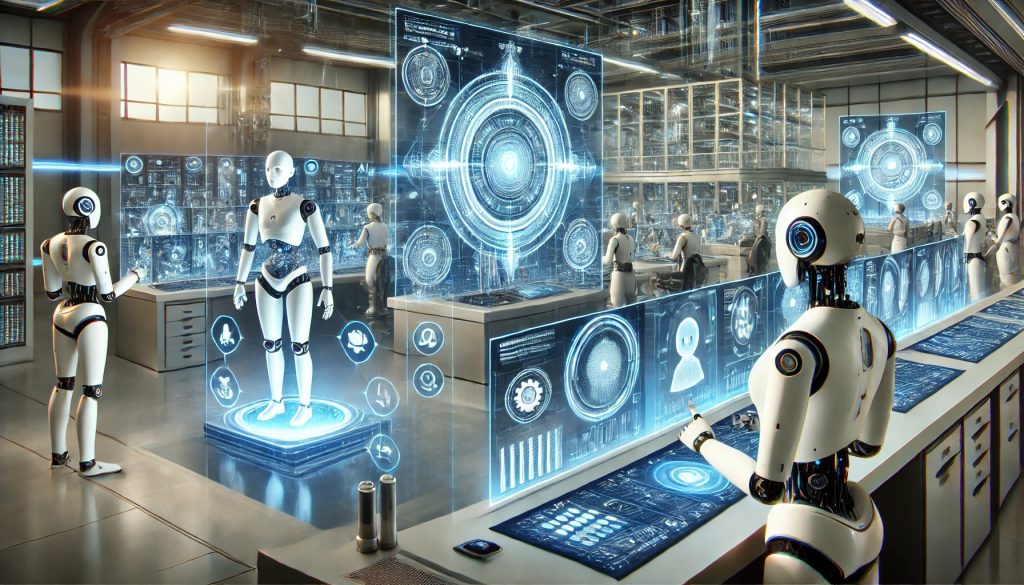
AI-Powered Automation and Conversational AI
Automating tasks with AI streamlines and personalizes our digital world. AI makes communication faster and problem-solving more efficient, even potentially saving lives in certain sectors.
Automating Tasks
Automation with AI isn’t just about efficiency and cost savings. It fosters smarter operations through reduced error in business.
In 2025, intelligent automation will predict equipment failures, optimize supply chains, and create new value. From automated cybersecurity in financial services to inventory management in e-commerce, AI automation spans nearly every aspect of the marketplace.
Enhancing Conversations
Improved natural language processing is transforming conversations. AI is moving beyond shortcut lingo to fuller language comprehension in many platforms and apps.
Chatbots and humans now interact to streamline human time and provide intelligent solutions to user problems. Think Anthropic’s Claude AI in 2024, capable of handling intricate, contextual dialogues.
Edge AI and Human-AI Collaboration in AI Trends 2025
AI is moving closer to the edge, enabling faster, safer, and more personalized interactions across devices without sacrificing privacy. This is increasingly important given the rising threat of malicious internet activity.
Benefits and Applications of Edge AI
| Benefit | Application |
|---|---|
| Faster Processing | Real-time video analytics |
| Enhanced Privacy | Secure medical devices |
| Offline Functionality | Remote monitoring systems |
Consider medical implants with AI communicating remotely with healthcare providers, or AI optimizing self-driving and traditional cars on the go. Local processing is transforming sectors requiring instant responses, improving life with minimal privacy risks.
Human-AI Collaboration Evolution
The evolution of AI trends fosters a blended work environment, from small teams to large corporations like McKinsey.
Imagine AI systems assisting radiologists or designers collaborating with generative AI models for quick customer solutions. Collaboration not only speeds production and reduces errors but also improves lives.
This synergy between humans and machines is the next evolutionary step, evidenced by how AI is impacting the recruiting and talent sectors. AI is becoming essential for optimizing complex tasks and achieving a competitive edge in a rapidly evolving market.
Impacts of AI Trends 2025 on Economy, Society, and Politics
Economic ripples from AI-driven automation will be felt across all worker classes, impacting productivity in manufacturing, service work, and AI consulting.
Economic Impacts
AI-driven automation will reshape global workforce landscapes. Governments are preparing for these changes, as seen in daily news.
While some fear job displacement, the focus should be on upskilling and workforce transitions. Smart economic policy is crucial for harnessing these technological changes and ensuring no segment of society is left behind. Individuals must also embrace retraining in technology or trades to remain relevant in the changing job market.
Social Impacts
AI trends 2025 are already creating opportunities to address complex societal challenges. AI can personalize education, identifying students who need extra help. This digital twin technology offers tailored learning experiences and supports educators.
AI can enhance society as long as it complements, not replaces, human interaction. Maintaining human bonds in learning and community is essential. Ethical guidelines must guide AI development and data analytics to maximize the benefits of AI tools.
Political Impacts
Generative models are disrupting creative and business workflows. The geopolitical implications of AI trends in 2025 are vast. AI’s impact on global power dynamics must be addressed.
Disinformation fueled by AI threatens all levels of communication. International cooperation for safe and transparent AI practices is essential. NATO’s AI strategy exemplifies the emerging geopolitical shifts, as the world develops policy safeguards to promote trust and growth in the face of evolving AI.
FAQs about New AI in 2025
What are future trends of AI?
Future AI trends point towards more specialized, human-centered AI applications, including personalized medicine, hyper-realistic virtual environments, and tools that augment human creativity and problem-solving.
What new technology is coming out in 2025?
While predicting specific releases is difficult, 2025 promises advancements in several areas. Expect more sophisticated AR/VR devices as immersive technology continues to evolve alongside AI.
Foldable mobile devices will likely become more streamlined with thinner, faster screens. New battery materials will drive the shift towards electric and autonomous vehicles.
What is the top strategic technology trend for 2025: agentic AI?
Agentic AI is a top trend. This involves AI evolving from task-based operation to autonomous action guided by objectives, not instructions.
Agentic AI systems are becoming independent decision-makers, offering flexibility for human operators in various contexts. This empowers individuals, small businesses, and large organizations across physical and digital work environments.
Will AI replace jobs in 2025?
While AI-driven automation has begun displacing some jobs, the situation is more nuanced. AI is also creating new jobs, such as prompt engineers, AI trainers, and AI ethicists.
Adaptability is key. Reskilling and learning to manage AI systems will be essential. Individuals can thrive by specializing in areas like ethical AI and risk management. Effective policy recommendations are needed to support this workforce transition.
Conclusion: New AI in 2025
AI trends 2025 represent a pivotal moment. AI is transforming our economic, social, and political landscapes. Success depends on smart strategies that balance innovation with responsible AI implementation.
Understanding your goals and balancing risks are essential for harnessing AI’s potential. By blending innovation, adaptation, and responsible AI usage, we can achieve real growth.
